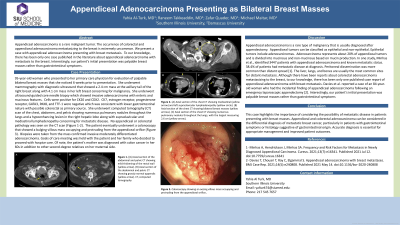Monday Poster Session
Category: Colon
P1737 - Appendiceal Adenocarcinoma Presenting as Bilateral Breast Masses
Monday, October 23, 2023
10:30 AM - 4:15 PM PT
Location: Exhibit Hall

Has Audio

Yahia Al Turk, MD
Southern Illinois University
Springfield, IL
Presenting Author(s)
Award: ACG Case Reports Journal Award (Trainee)
Award: Presidential Poster Award
Yahia Al Turk, MD1, Raneem Takkeaddin, MD2, Zafar Quader, MD1, Michael Maitar, MD1
1Southern Illinois University, Springfield, IL; 2Damascus University, Springfield, IL
Introduction: Appendiceal adenocarcinoma is a rare malignant tumor. The occurrence of colorectal and appendiceal adenocarcinoma metastasizing to the breast is extremely uncommon. We present a case of appendiceal adenocarcinoma presenting with breast metastasis. To our knowledge, there has been only one case published in the literature about appendiceal adenocarcinoma with metastasis to the breast. Interestingly, our patient’s initial presentation was palpable breast masses rather than gastrointestinal symptoms.
Case Description/Methods: 95-year-old woman who presented to her primary care physician for evaluation of palpable bilateral breast masses that she noticed 6 weeks prior to presentation. She underwent mammography with diagnostic ultrasound that showed a 2.4 cm mass at the axillary tail of the right breast along with 4.1 cm mass in her left breast concerning for malignancy. She underwent ultrasound-guided core needle biopsy which showed invasive adenocarcinoma with enteric and mucinous features. Cells were positive for CK20 and CDX2. CK7, estrogen receptor, progesterone receptor, GATA3, PAX8, and TTF-1 were negative which was consistent with colorectal as the primary source. She underwent computed tomography (CT) scan of the chest, abdomen, and pelvis showing numerous pulmonary nodules and a hypoenhancing lesion in the right hepatic lobe along with supraclavicular and mediastinal lymphadenopathy concerning for metastatic disease. No appendiceal or colorectal pathology was seen on the CT scan. The patient eventually underwent a colonoscopy that showed a bulging villous mass occupying and protruding from the appendiceal orifice. Biopsies were obtained from the mass and confirmed an invasive moderately differentiated adenocarcinoma. Goals of care meeting was held with the patient and her family who decided to proceed with hospice care. Of note, the patient's mother was diagnosed with colon cancer in her 60s in addition to other second-degree relatives on her maternal side.
Discussion: This case highlights the importance of considering the possibility of metastatic disease in patients presenting with breast masses. Appendiceal adenocarcinoma should be considered in the differential diagnosis of metastatic breast cancer, particularly in patients with gastrointestinal symptoms or histology suggestive of gastrointestinal origin. Accurate diagnosis is essential for appropriate management and improved patient outcomes.

Disclosures:
Yahia Al Turk, MD1, Raneem Takkeaddin, MD2, Zafar Quader, MD1, Michael Maitar, MD1. P1737 - Appendiceal Adenocarcinoma Presenting as Bilateral Breast Masses, ACG 2023 Annual Scientific Meeting Abstracts. Vancouver, BC, Canada: American College of Gastroenterology.
Award: Presidential Poster Award
Yahia Al Turk, MD1, Raneem Takkeaddin, MD2, Zafar Quader, MD1, Michael Maitar, MD1
1Southern Illinois University, Springfield, IL; 2Damascus University, Springfield, IL
Introduction: Appendiceal adenocarcinoma is a rare malignant tumor. The occurrence of colorectal and appendiceal adenocarcinoma metastasizing to the breast is extremely uncommon. We present a case of appendiceal adenocarcinoma presenting with breast metastasis. To our knowledge, there has been only one case published in the literature about appendiceal adenocarcinoma with metastasis to the breast. Interestingly, our patient’s initial presentation was palpable breast masses rather than gastrointestinal symptoms.
Case Description/Methods: 95-year-old woman who presented to her primary care physician for evaluation of palpable bilateral breast masses that she noticed 6 weeks prior to presentation. She underwent mammography with diagnostic ultrasound that showed a 2.4 cm mass at the axillary tail of the right breast along with 4.1 cm mass in her left breast concerning for malignancy. She underwent ultrasound-guided core needle biopsy which showed invasive adenocarcinoma with enteric and mucinous features. Cells were positive for CK20 and CDX2. CK7, estrogen receptor, progesterone receptor, GATA3, PAX8, and TTF-1 were negative which was consistent with colorectal as the primary source. She underwent computed tomography (CT) scan of the chest, abdomen, and pelvis showing numerous pulmonary nodules and a hypoenhancing lesion in the right hepatic lobe along with supraclavicular and mediastinal lymphadenopathy concerning for metastatic disease. No appendiceal or colorectal pathology was seen on the CT scan. The patient eventually underwent a colonoscopy that showed a bulging villous mass occupying and protruding from the appendiceal orifice. Biopsies were obtained from the mass and confirmed an invasive moderately differentiated adenocarcinoma. Goals of care meeting was held with the patient and her family who decided to proceed with hospice care. Of note, the patient's mother was diagnosed with colon cancer in her 60s in addition to other second-degree relatives on her maternal side.
Discussion: This case highlights the importance of considering the possibility of metastatic disease in patients presenting with breast masses. Appendiceal adenocarcinoma should be considered in the differential diagnosis of metastatic breast cancer, particularly in patients with gastrointestinal symptoms or histology suggestive of gastrointestinal origin. Accurate diagnosis is essential for appropriate management and improved patient outcomes.

Figure: Bulging villous mass occupying and protruding from the appendiceal orifice
Disclosures:
Yahia Al Turk indicated no relevant financial relationships.
Raneem Takkeaddin indicated no relevant financial relationships.
Zafar Quader indicated no relevant financial relationships.
Michael Maitar indicated no relevant financial relationships.
Yahia Al Turk, MD1, Raneem Takkeaddin, MD2, Zafar Quader, MD1, Michael Maitar, MD1. P1737 - Appendiceal Adenocarcinoma Presenting as Bilateral Breast Masses, ACG 2023 Annual Scientific Meeting Abstracts. Vancouver, BC, Canada: American College of Gastroenterology.

